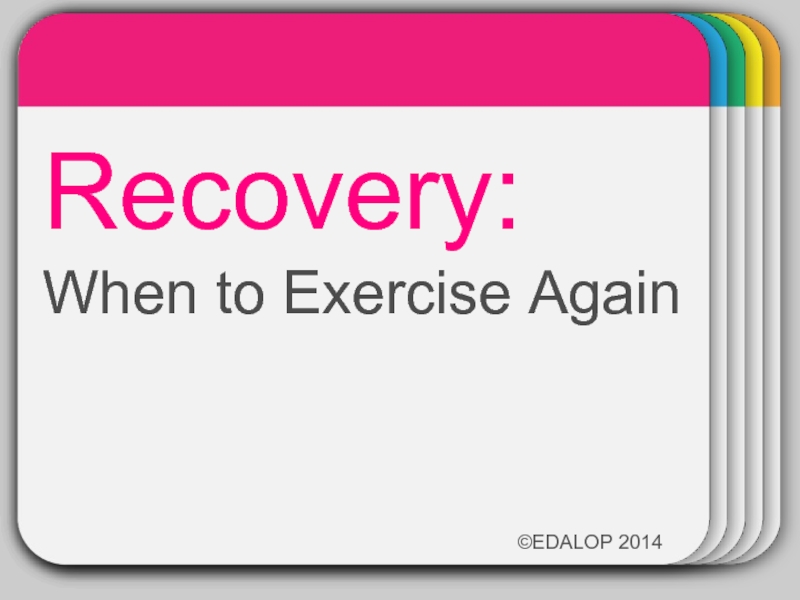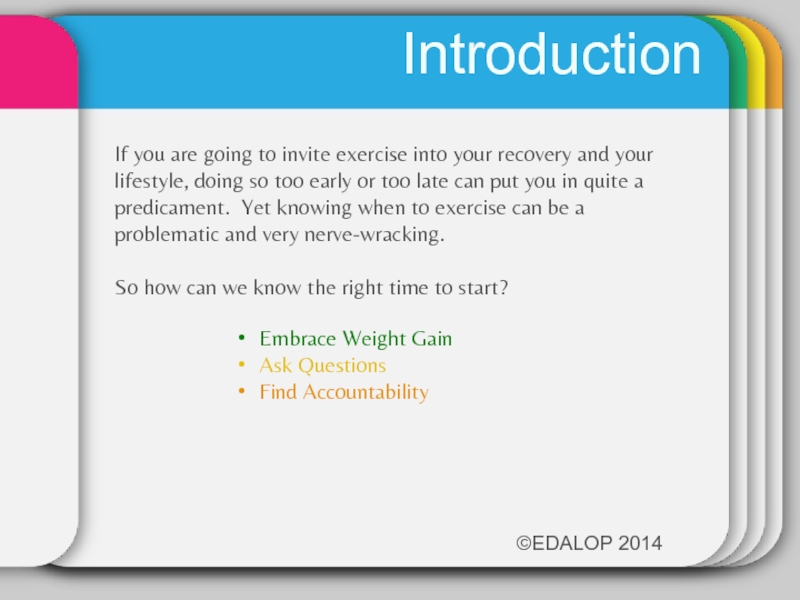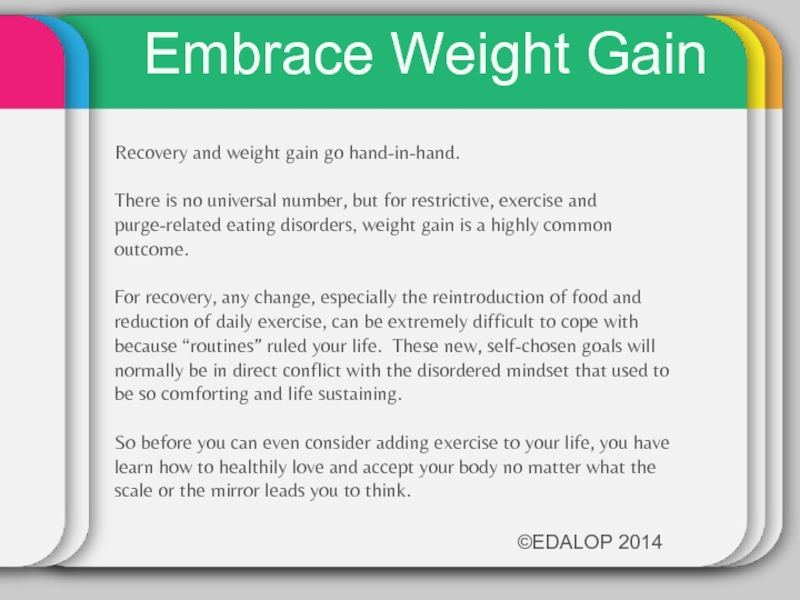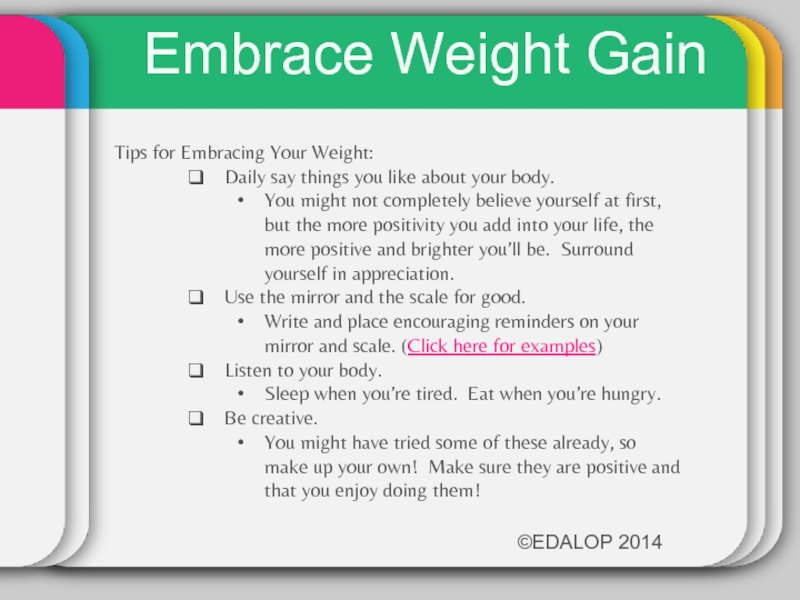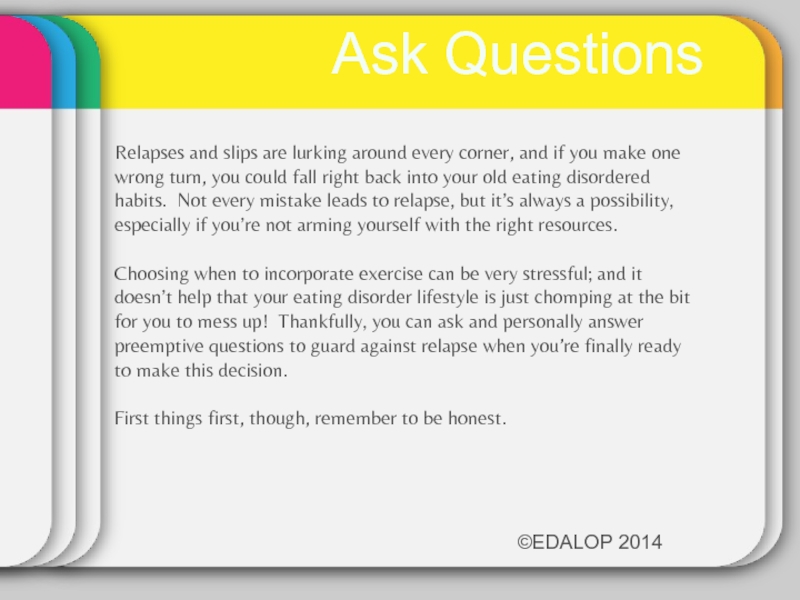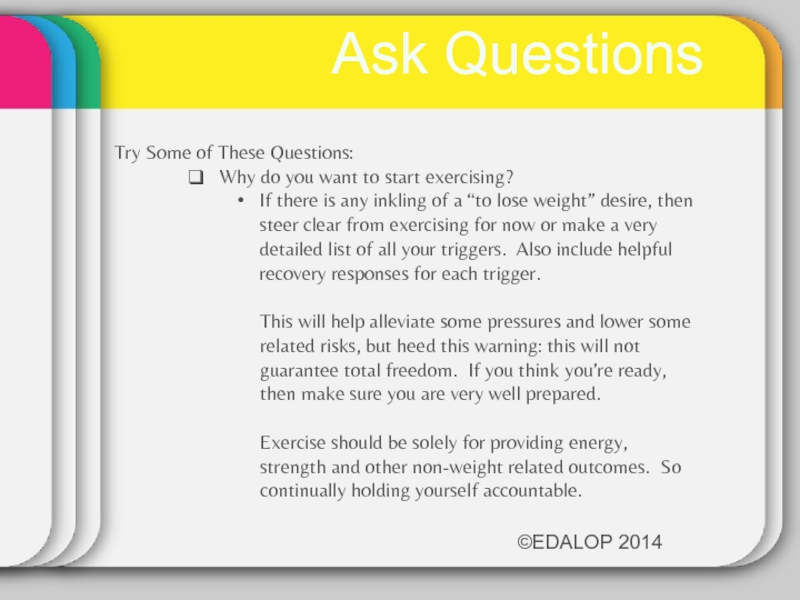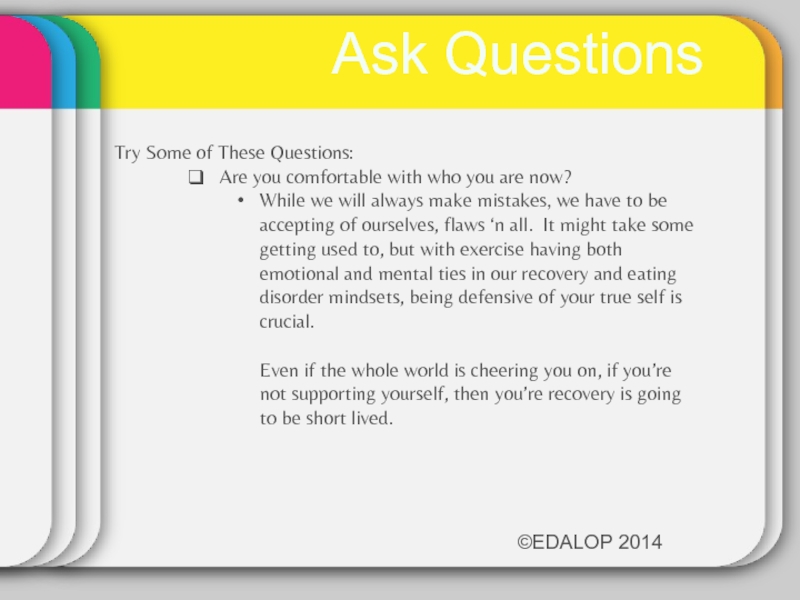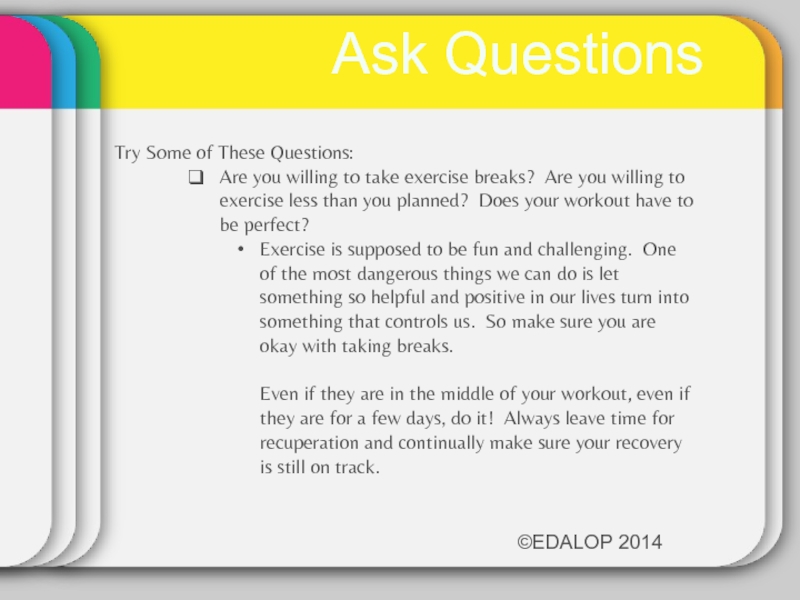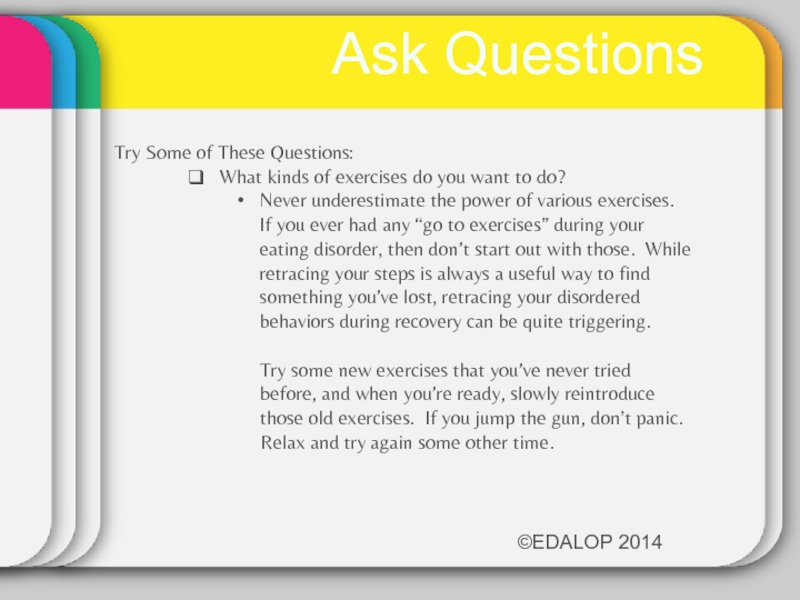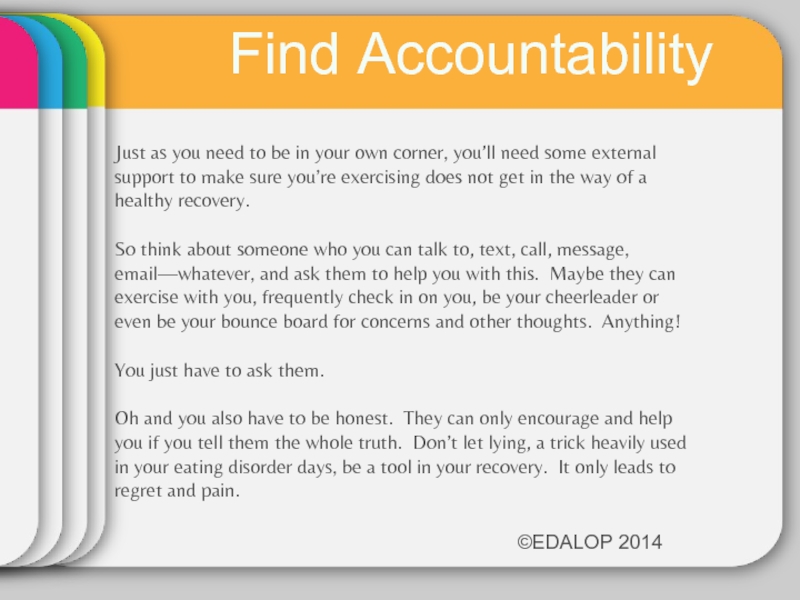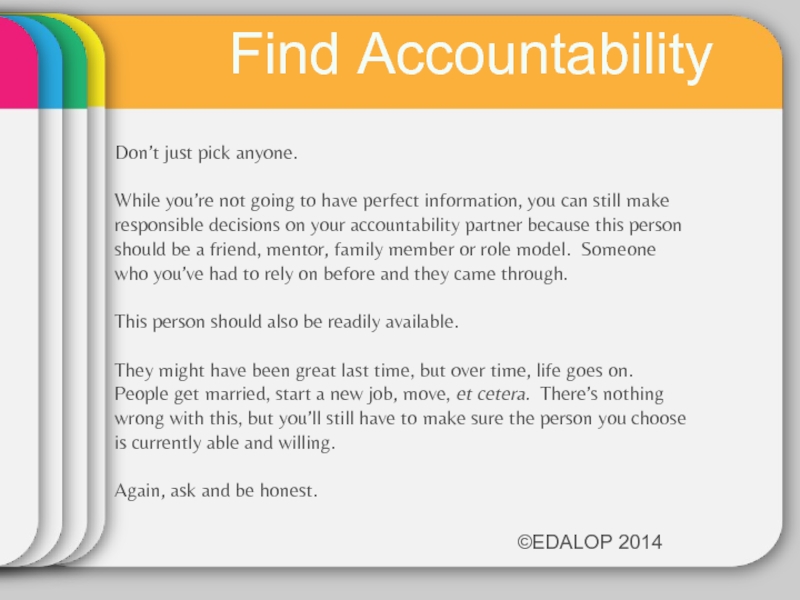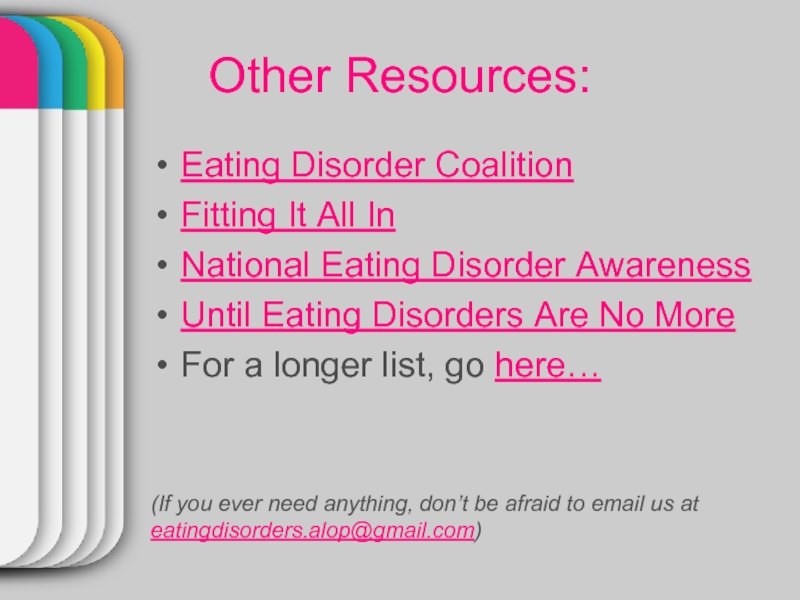- Главная
- Разное
- Дизайн
- Бизнес и предпринимательство
- Аналитика
- Образование
- Развлечения
- Красота и здоровье
- Финансы
- Государство
- Путешествия
- Спорт
- Недвижимость
- Армия
- Графика
- Культурология
- Еда и кулинария
- Лингвистика
- Английский язык
- Астрономия
- Алгебра
- Биология
- География
- Детские презентации
- Информатика
- История
- Литература
- Маркетинг
- Математика
- Медицина
- Менеджмент
- Музыка
- МХК
- Немецкий язык
- ОБЖ
- Обществознание
- Окружающий мир
- Педагогика
- Русский язык
- Технология
- Физика
- Философия
- Химия
- Шаблоны, картинки для презентаций
- Экология
- Экономика
- Юриспруденция
WINTER презентация
Содержание
- 1. WINTER
- 2. Introduction If you are going to invite
- 3. Embrace Weight Gain Recovery and weight gain
- 4. Embrace Weight Gain Tips for Embracing Your
- 5. Embrace Weight Gain Tips for Embracing Your
- 6. Ask Questions Relapses and slips are lurking
- 7. Ask Questions Try Some of These Questions:
- 8. Ask Questions Try Some of These Questions:
- 9. Ask Questions Try Some of These Questions:
- 10. Ask Questions Try Some of These Questions:
- 11. Find Accountability Just as you need
- 12. Find Accountability Don’t just pick anyone.
- 13. Other Resources: Eating Disorder Coalition Fitting It
Слайд 2Introduction
If you are going to invite exercise into your recovery and
So how can we know the right time to start?
Embrace Weight Gain
Ask Questions
Find Accountability
©EDALOP 2014
Слайд 3Embrace Weight Gain
Recovery and weight gain go hand-in-hand.
There is no universal
For recovery, any change, especially the reintroduction of food and reduction of daily exercise, can be extremely difficult to cope with because “routines” ruled your life. These new, self-chosen goals will normally be in direct conflict with the disordered mindset that used to be so comforting and life sustaining.
So before you can even consider adding exercise to your life, you have learn how to healthily love and accept your body no matter what the scale or the mirror leads you to think.
©EDALOP 2014
Слайд 4Embrace Weight Gain
Tips for Embracing Your Weight:
Reacquaint yourself with food.
Like an
Give your body a new purpose.
Instead of a weight loss machine or a symbol of your lack of control, your body can be honored and respected for its true, intended uses.
Consult a nutritionist, physician, psychologist, et cetera.
You don’t need a professional to help you recover, but never count them out as a resource because they can provide information, encouragement and accountability.
©EDALOP 2014
Слайд 5Embrace Weight Gain
Tips for Embracing Your Weight:
Daily say things you like
You might not completely believe yourself at first, but the more positivity you add into your life, the more positive and brighter you’ll be. Surround yourself in appreciation.
Use the mirror and the scale for good.
Write and place encouraging reminders on your mirror and scale. (Click here for examples)
Listen to your body.
Sleep when you’re tired. Eat when you’re hungry.
Be creative.
You might have tried some of these already, so make up your own! Make sure they are positive and that you enjoy doing them!
©EDALOP 2014
Слайд 6Ask Questions
Relapses and slips are lurking around every corner, and if
Choosing when to incorporate exercise can be very stressful; and it doesn’t help that your eating disorder lifestyle is just chomping at the bit for you to mess up! Thankfully, you can ask and personally answer preemptive questions to guard against relapse when you’re finally ready to make this decision.
First things first, though, remember to be honest.
©EDALOP 2014
Слайд 7Ask Questions
Try Some of These Questions:
Why do you want to start
If there is any inkling of a “to lose weight” desire, then steer clear from exercising for now or make a very detailed list of all your triggers. Also include helpful recovery responses for each trigger.
This will help alleviate some pressures and lower some related risks, but heed this warning: this will not guarantee total freedom. If you think you’re ready, then make sure you are very well prepared.
Exercise should be solely for providing energy, strength and other non-weight related outcomes. So continually holding yourself accountable.
©EDALOP 2014
Слайд 8Ask Questions
Try Some of These Questions:
Are you comfortable with who you
While we will always make mistakes, we have to be accepting of ourselves, flaws ‘n all. It might take some getting used to, but with exercise having both emotional and mental ties in our recovery and eating disorder mindsets, being defensive of your true self is crucial.
Even if the whole world is cheering you on, if you’re not supporting yourself, then you’re recovery is going to be short lived.
©EDALOP 2014
Слайд 9Ask Questions
Try Some of These Questions:
Are you willing to take exercise
Exercise is supposed to be fun and challenging. One of the most dangerous things we can do is let something so helpful and positive in our lives turn into something that controls us. So make sure you are okay with taking breaks.
Even if they are in the middle of your workout, even if they are for a few days, do it! Always leave time for recuperation and continually make sure your recovery is still on track.
©EDALOP 2014
Слайд 10Ask Questions
Try Some of These Questions:
What kinds of exercises do you
Never underestimate the power of various exercises. If you ever had any “go to exercises” during your eating disorder, then don’t start out with those. While retracing your steps is always a useful way to find something you’ve lost, retracing your disordered behaviors during recovery can be quite triggering.
Try some new exercises that you’ve never tried before, and when you’re ready, slowly reintroduce those old exercises. If you jump the gun, don’t panic. Relax and try again some other time.
©EDALOP 2014
Слайд 11
Find Accountability
Just as you need to be in your own corner,
So think about someone who you can talk to, text, call, message, email—whatever, and ask them to help you with this. Maybe they can exercise with you, frequently check in on you, be your cheerleader or even be your bounce board for concerns and other thoughts. Anything!
You just have to ask them.
Oh and you also have to be honest. They can only encourage and help you if you tell them the whole truth. Don’t let lying, a trick heavily used in your eating disorder days, be a tool in your recovery. It only leads to regret and pain.
©EDALOP 2014
Слайд 12
Find Accountability
Don’t just pick anyone.
While you’re not going to have perfect
This person should also be readily available.
They might have been great last time, but over time, life goes on. People get married, start a new job, move, et cetera. There’s nothing wrong with this, but you’ll still have to make sure the person you choose is currently able and willing.
Again, ask and be honest.
©EDALOP 2014
Слайд 13Other Resources:
Eating Disorder Coalition
Fitting It All In
National Eating Disorder Awareness
Until Eating
For a longer list, go here…
(If you ever need anything, don’t be afraid to email us at eatingdisorders.alop@gmail.com)
